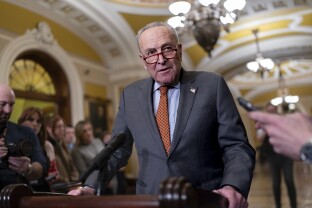A day after Senate Minority Leader Chuck Schumer said there weren’t enough Democratic votes to advance the House GOP’s government funding bill, Schumer indicated that, on second thought, at least some Democrats would vote for the legislation and work with Republicans to avert a shutdown.
In other words, Schumer said, Democrats are caving.
“Unless Congress acts, the government will shut down tomorrow at midnight,” Schumer said Thursday evening, lamenting that Republicans wouldn’t support a one-month continuing resolution to continue spending negotiations on a bipartisan deal.
He said the “Republican rejection” leads Democrats to a decision: “Either proceed with the bill before us, or risk Donald Trump throwing America into the chaos of a shutdown.”
“This in my view is no choice at all,” Schumer said.
He added that the bill before the Senate is not a “clean CR.”
“It is deeply partisan,” Schumer said. “It doesn’t address far too many of this country’s needs. But I believe allowing Donald Trump to take even much more power via a government shutdown is a far worse option.”
“I will vote to keep the government open and not shut it down,” he said.
Schumer’s decision to support ending debate on the funding bill effectively ends the suspense of whether there will be a shutdown. While it’s possible there could be a temporary lapse — government funding runs out at midnight Friday night, and any senator can gum up the procedural works — Democrats seem intent on voting for cloture. (In the Senate, 60 votes are typically needed for cloture before lawmakers can move to a final vote.)
The Democratic leader told reporters after his announcement that there are still some details to work out, including a time agreement and discussions on amendments. But Schumer’s decision to end debate comes after he said on the Senate floor Wednesday that there weren’t enough Democratic votes for the bill. Senate Republicans never seemed to buy his warning, with GOP leaders promising to move forward with a vote regardless of Schumer’s declaration.
Ultimately, after Democrats met behind closed doors for the third consecutive day — and reporters overheard yelling in the Democratic caucus room for the second consecutive day — Schumer admitted he was the one who didn’t have the votes to block the Republican bill.
The timing has a touch of irony. Two key swing votes — Sens. Mark Kelly and Ruben Gallego — both announced Thursday that they wouldn’t, in fact, support the bill. And Democrats had appeared increasingly serious about blocking the legislation, though plenty of senators remained noncommittal throughout the process.
The decision to back cloture is the culmination of days of internal squabbling among Senate Democrats, with many lawmakers advocating for a one-month continuing resolution instead of the six-and-a-half-month GOP bill. The Democratic Caucus has debated the merits of holding out all week, holding three-hour-long lunches for the last three days.
Although many Democrats spoke out vociferously, many others left themselves wiggle room, declining to say definitively whether they would oppose the legislation — and whether they would oppose the legislation coming to the floor for a final vote.
But throughout the week, there have clearly been cracks in the Democratic resolve. Some Senate Democrats signaled by Thursday that they’d possibly vote to advance the GOP bill if they were given an amendment vote on the short-term continuing resolution. Schumer on Thursday said it is still Democrats’ “preference” to have an amendment vote on the short-term resolution. And he added that many Senate Democrats are mulling their decisions on how to vote overall.
It’s an about face from just one day prior, when Schumer said his caucus was “unified,” and that there were not enough votes for cloture.
“As of yesterday, there were not enough votes to pass it. I thought I ought to let people know that,” Schumer told reporters after his announcement. “And as members study it and look at it, each is making his or her own decision.”
There’s been an air of confusion on whether the shutdown threat was a bluff — or “total theater,” as Democratic Sen. John Fetterman put it.
“The second we make any amendments, that’s passively voting for it, not proactively, but passively,” Fetterman told reporters Thursday.
“That’s not honest, honestly,” Fetterman added. “Either you got to vote to shut the government down or to acknowledge that you passively or privately vote for a deeply, deeply flawed CR. That’s really the choice.”
So far, Fetterman is the only other Senate Democrat to say he’ll vote to advance the funding bill. Republican Sen. Rand Paul has conditioned his support for cloture on receiving a vote on his amendment, which would codify some cuts made by the Department of Government Efficiency. Paul’s request is likely to be granted.
Senate Majority Leader John Thune has teed up a cloture vote for the GOP funding measure on Friday.
“The only thing right now standing between us and keeping the government open is getting the Democrats to a place where they’re willing to agree to a vote on that,” Thune said Thursday. “If they need a vote on their short-term CR, we’re willing to entertain that, but at some point, we’ve got to see some evidence that they are alright to move forward.”
—
Ursula Perano is a reporter at NOTUS. Ben T.N. Mause is a NOTUS reporter and an Allbritton Journalism Institute fellow.
Sign in
Log into your free account with your email. Don’t have one?
Check your email for a one-time code.
We sent a 4-digit code to . Enter the pin to confirm your account.
New code will be available in 1:00
Let’s try this again.
We encountered an error with the passcode sent to . Please reenter your email.


